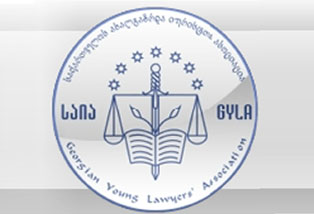Georgian Young Lawyers’ Association (GYLA) publishes legal opinion on the draft Constitutional law on Amendments to the Constitution of Georgia. The Parliament of Georgia adopted a resolution on promulgation of the draft law and establishment of a steering committee for public discussions of the draft on December 28, 2012.
The proposed draft repeals the prohibition to dissolve the parliament during first six months after its election and during last six months of the presidential term. Further, it revokes the authority of the president to appoint a government if the legislative body fails to approve the government during the noted period of time. Initiators of the draft law state that these amendments have been elaborated to avert the risks of political crisis.
GYLA believes that reduction of power of the president is a positive development. Current stipulations of the Constitution bear a high risk of crisis in the present political situation, without providing an effective mechanism for neutralizing the threat. However, if the draft law aims at elimination of the possibility of a political crisis, the necessity to reduce constitutional power of the president to dissolve the parliament is unclear. Neither does the explanatory note contain any substantiation in this regard. Reduction of the foregoing guarantees will pose additional threats in view of the constitutional system of Georgia. In mixed systems of governance, legitimization of the newly elected parliament, maintaining stability of the government and observance of the constitutional system of checks and balances determines the necessity to grant “immunity” to the parliament. The president should not have the power to play role in formation of politics greater than the parliament and the government. In this respect, it is important that the president is not delegated with the authority that would allow him to manipulate with the possibility of dissolution of the parliament. Further, it is important to realize the treat of political crises. If the parliament has been dissolved and the government has found itself in an unstable situation, basically the country has no “able institutes”, which may pose a threat to stability of the country.
Further, there are no safeguards in the Constitution of Georgia against utilization of the mechanism again, after the parliament has been dissolved once, meaning that in absence of the first “6-month immunity” the president will be able to dissolve newly-elected parliament for as many times as s/he wants to, if the parliament refuses to follow his/her will. This reinforces the president’s power over the parliament in a way that the legislative branch becomes depended on the president. This is counterproductive in view of the motivation of the proposed changes.
The proposed constitutional draft needs to be revised from the point of view of legal technique.
Thus, GYLA believes that in view of the possibility of political crisis and the absence of constitutional mechanisms to neutralize the possibility, reduction of presidential powers is expedient in general; however, stability of the parliament should not be compromised and the guarantees for the immunity of the legislative body must be maintained. Further, GYLA does not support making of fragmented amendments to the Constitution. Any proposed changes to the supreme law of the country must be considered with maximum involvement of public at large.




